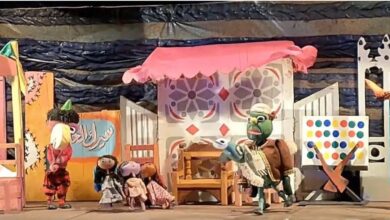Last week, as part of our Alf Leila We Leila Ramadan storytelling series, we brought you part one of the story of al-Naschar, the barber's fifth brother, whose ability to gain a fortune quickly–whether by inheritance or by charity–is rivaled only by his knack for losing it. Here, we bring you the second half of al-Naschar’s tale, as retold by Al-Masry Al-Youm reporter John Ehab.
When we left him, al-Naschar had just escaped the cellar of his captors, a rich woman and her slaves, who had robbed him and left him for dead. Injured and angry, he made his way to the house of his brother, the barber, where he now sits dressing his wounds and plotting his revenge.
Al-Naschar may not seem like the luckiest man in the world–he has, after all, just lost a recently acquired fortune and been savagely beaten–but the former beggar was very lucky indeed to escape death, the cellar, and, one month later, find himself mostly recovered from his injuries. But the story is far from over.
One day, his physical wounds manifesting in a slight limp and his mental wounds manifesting in the blind pursuit of vengeance, al-Naschar sees and approaches the old woman (a member of the team of thieves) and, pretending to be a woman himself, asks to borrow scales to weigh his (nonexistent) Persian gold.
He spoke to her in a cackling voice. “Excuse me dear, do you know where I can exchange this money?”
The con-woman is easily hooked.
Not knowing she was the prey rather than the predator, the elderly criminal replied, “Lucky for you, my son is in this very business. Let me take you to him.”
Al-Naschar slowly followed the old woman to the house where he had previously been robbed. When he entered the house he was greeted by the same Greek servant.
The same Greek servant, that is, who previously rubbed salt in al-Naschar’s wounds and threw him in the basement to die. The second slave, a large man who had been charged with beating al-Naschar in the first place, soon appears.
When the towering man saw al-Naschar disguised as an old woman he said, menacingly, “You’ve come to meet your destiny, you old crow.”
Here, things get bloody. Al-Naschar wields a saber and as soon as the slave turns his big head al-Naschar severs it from his body.
Immediately, al-Naschar whipped out a saber from under his cloak and, without hesitating, directed it toward the neck of the slave, sending his head flying across the room. The next moment the Greek servant entered with salt, preparing for the usual procedure, but before she realized what was happening, al-Naschar swung his sword, beheading her also.
All the commotion brings the old woman running in. When she sees the bloodshed, she tries to escape, but is not fast enough. In typically vengeful form, al-Naschar reminds her of her crimes against him.
“You hypocritical old woman,” he screamed. “You came to my house to pray and proved yourself to be an evil hag. Now receive your just reward.” And with that he chopped the old woman into four pieces.
Al-Naschar begins roaming the halls, saber in hand, searching for the beautiful woman who promised him marriage and wealth and instead stole his money and sentenced him to death. Strangely, when he finds her, al-Naschar spares her life, but demands that she explain how she began conspiring with the now-headless slaves.
The woman told al-Naschar that she had once been married to an honest merchant and that she, too, had been deceived and held captive by the dark-skinned man. For three years she had been used by the trio that al-Naschar had now rescued her from.
After listening to the woman’s harrowing tale, al-Naschar muses aloud that the group must have, after all these years of thieving, become very wealthy. The beautiful woman confirms this, taking the barber’s brother to a room full of gold, and telling him to gather men to help him carry it away.
Al-Naschar is, true to form, eager to spontaneously amass a fortune. But, once again, his greed leads to his deception.
Al-Naschar soon returned with ten sturdy laborers only to find that the treasure had disappeared. He had once again been deceived by the beautiful woman. Refusing to end his day in vain, and wanting to regain his lost money, al-Naschar asked the workers to take away the furniture.
Having thus morphed from hero to thief, al-Naschar caps his imperfect crime with a grave mistake; upon leaving the house he has just plundered, he forgets to lock the door.
When the neighbors saw that the front door to the house had been left open, they reported it to the police, who began to investigate the missing furniture. When the furniture was found at al-Naschar’s place, he was arrested and taken to a judge.
In lieu of a prison sentence, al-Naschar is exiled from town. But the story of the barber’s unlucky fifth brother is not over.
Al-Naschar is exiled, becoming again the beggar he was in the beginning. And his bad luck follows him out of town. On his journey, al-Naschar is attacked by a band of robbers, who leave him penniless and naked on the side of the road.
The tale of al-Naschar ends where it began today: at the home of his brother, the barber, having his wounds (and his naked body) dressed.
Still, in spite of his many beatings and lost fortunes, al-Naschar has something to be grateful for. Unlike so many in this tale, at least the beggar still has his head, dense though it may be.




